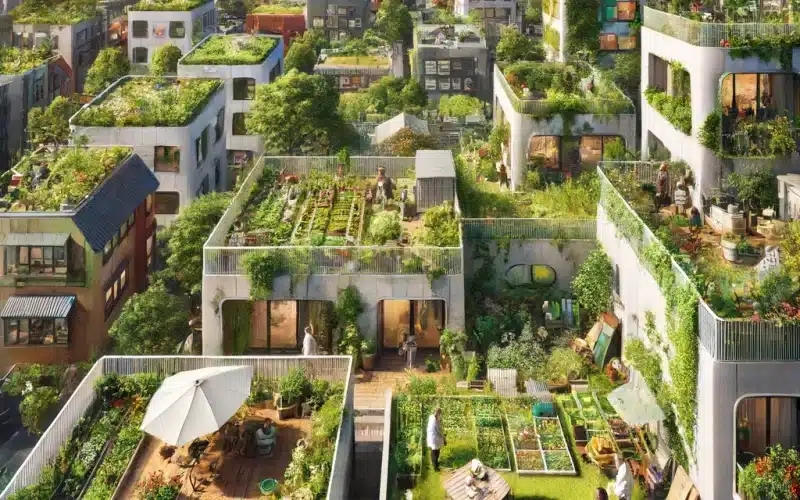
Urban gardening is not just a trend; it’s a necessity in today’s rapidly urbanizing world. As cities expand, the need for green spaces becomes more critical. Sustainable gardening in urban areas offers numerous benefits, not only for the environment but also for the well-being of city dwellers. By integrating innovative gardening techniques and tools, urban residents can create lush, productive spaces even in the most confined areas.
Why Sustainable Gardening in Cities?
Sustainable gardening in cities is crucial for several reasons. Firstly, it helps combat urban heat island effects, where cities experience higher temperatures than surrounding areas due to extensive concrete and asphalt. Green spaces cool these areas, improving air quality and reducing energy consumption for cooling.
Moreover, urban gardening promotes biodiversity by providing habitats for pollinators like bees and butterflies, which are essential for a healthy ecosystem. It also encourages the use of native plants, which are well-adapted to local climates and require less water and maintenance, making gardens more sustainable.
But the benefits are not just environmental. Urban gardening enhances mental and physical health. Studies show that interacting with plants reduces stress, anxiety, and depression. Planting memorial trees for instance is also part of processing the loss of loved ones for instance. Gardening also provides a moderate-intensity physical activity, contributing to overall fitness. Furthermore, growing your own food ensures access to fresh, organic produce, which is healthier and reduces the carbon footprint associated with food transportation.
Innovative Products and Techniques
Recent technological advancements have made sustainable urban gardening more accessible and efficient. Here are some innovative products and techniques that have revolutionized urban gardening:
- Sustee Plant Moisture Sensor: This device measures soil moisture levels and changes color to indicate when plants need watering. It’s ideal for busy urban dwellers, ensuring plants are adequately watered without wastage.
- Vigoroot Self-Watering Planters: These planters promote root health through air pruning and provide consistent water supply, reducing the frequency of watering and maintenance.
- Eco-Friendly Rain Gardens: These gardens capture and utilize rainwater runoff, reducing water waste and filtering pollutants. They often incorporate native plants that handle variable water conditions, making them perfect for urban areas prone to flooding.
- Vertical Garden Systems: These systems maximize space by allowing plants to grow upwards, making them ideal for balconies and patios. They enhance greenery and air quality in confined urban spaces.
- Hydroponic and Aquaponic Systems: These soilless systems use nutrient-rich water to grow plants and can be used indoors, saving space and water while enabling year-round cultivation of vegetables and herbs.
Implementation and Impact of Urban Gardening
Urban gardening projects can be implemented on various scales, from small balcony gardens to community gardens. For instance, the Urban Agriculture and Innovative Production Grants support the development of urban farms that provide fresh produce to city residents and address food insecurity through modern agricultural techniques.
Innovative gardening products like those from Haxnicks, including bamboo plant markers and pots, offer sustainable alternatives to plastic, aligning with eco-friendly practices and reducing environmental impact.
Urban gardening offers significant health benefits. Here is a summary of the key health advantages:
| Health Benefit | Description |
|---|---|
| Better Nutrition | Community gardeners eat 37.5% more fruits and vegetables than non-gardeners (Garden Pals). This access to fresh, organic produce improves overall diet quality and nutrient intake. |
| Physical Activity | Gardening provides moderate exercise, helping to reduce obesity and improve cardiovascular health. Women community gardeners are 46% less likely to be overweight than their neighbors. |
| Mental Health | Interacting with nature reduces stress, anxiety, and depression, enhancing mental well-being. Studies have shown that gardening can significantly reduce cortisol levels and improve mood. |
| Social Interaction | Community gardens foster social cohesion, providing a sense of belonging and community support. They improve perceptions of neighborhood safety and promote social ties. |
| Improved Air Quality | Plants filter pollutants, improving the air quality in urban environments. |
Sustainable gardening in the city is a multifaceted solution that addresses environmental, social, and health issues. By adopting innovative tools and techniques, urban residents can transform their limited spaces into productive, green havens. This not only enhances their quality of life but also contributes to the overall sustainability of urban environments. As cities continue to grow, the integration of green spaces will become increasingly vital, making sustainable urban gardening an essential practice for the future.
Urban Gardening in Türkiye
Now let’s look at the situation in Türkiye. Urban gardening has seen a significant rise in popularity across many cities in Türkiye. This trend is driven by various motivations, including health benefits, environmental concerns, and community engagement.
A report on urban gardening trends shows that Istanbul, the largest city in Türkiye, has several allotment gardens, such as the historic Yedikule and Kuzguncuk gardens. These gardens are managed by the Greater Istanbul Municipality and are utilized by residents for growing fruits and vegetables.
According to the Turkish Statistical Institute (TÜİK), urban gardening initiatives have expanded, showing the importance of preserving urban green spaces. Istanbul alone has numerous examples of both formal and informal gardening projects, demonstrating a strong community commitment to urban gardening.
In terms of specific data, it is estimated that urban gardening contributes significantly to local food production and environmental sustainability. However, precise national statistics on the percentage of cities in Türkiye with active urban gardening initiatives are not readily available. The trend is supported by increasing awareness and participation in urban gardening practices, as seen in various community and educational projects throughout major urban centers.
